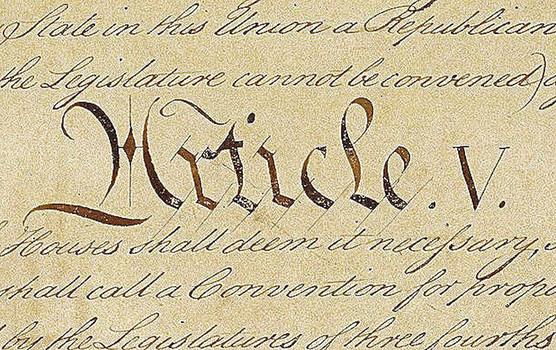Rep. Michael Moffett’s recent letter advocating for a Convention of States (COS) to address our nation’s financial crisis is well-intended, but it overlooks fundamental principles of our constitutional system. While runaway federal spending is indeed a major problem, the proposed solution—a COS—is unnecessary and potentially dangerous. The reality is that states already have the power to rein in federal overreach without amending the Constitution.
The Power of the Purse—A Tool States Refuse to Use
One of the most overlooked checks on federal power is the ability of states to reject federal money. The Constitution does not require states to accept federal funds, yet most do, even when those funds come with burdensome regulations that undermine state sovereignty.
A clear example of this is federal highway funding. In 1974, Congress passed a law setting the national speed limit at 55 mph—not because it had constitutional authority to do so, but because it tied compliance to federal highway funds. States that refused to enforce the speed limit would lose federal road money. Instead of challenging the constitutionality of this move, states complied. Similarly, in 1984, Congress raised the drinking age to 21 using the same tactic, despite the fact that regulating alcohol is a state power under the Tenth Amendment.
The same strategy applies today with education, healthcare, and even local policing. States choose to take federal money in exchange for policy control. If states truly want to restore fiscal discipline and reclaim their sovereignty, they don’t need a COS—they simply need to stop taking federal money with strings attached.
The Myth That Congress Cannot Be Controlled
Moffett argues that Congress is inherently incapable of spending reform because politicians are incentivized to “bring home the bacon.” While this is often true, it ignores past examples of successful spending restraint.
Take the example of Calvin Coolidge’s administration in the 1920s. The federal government had amassed significant debt following World War I, but Coolidge, along with his Treasury Secretary Andrew Mellon, imposed aggressive spending cuts. They reduced federal expenditures by nearly 50% and even paid down the national debt, all without needing a constitutional amendment.
The lesson here is simple: Congress can be forced to act responsibly when there is enough political pressure. If states refuse federal funds and demand real budget cuts, Washington will have no choice but to listen.
A COS: A Risky and Unnecessary Gamble
Moffett dismisses concerns about a “runaway convention,” but the only historical example of an Article V-style convention—the 1787 Constitutional Convention—did not just amend the Articles of Confederation. It replaced them entirely with a new system of government. While that outcome was ultimately beneficial, it was a radical departure from what was intended.
In today’s political climate, where activists from both the left and right seek sweeping constitutional changes, do we really want to gamble with the foundational framework of our nation? A COS could just as easily expand government power as it could restrain it. There is no guarantee it would focus solely on spending, and once the process begins, there is no way to fully control its outcome.
The Real Path Forward
If Moffett and others truly want to address federal spending, the solution isn’t rewriting the Constitution—it’s demanding that states use their existing powers.
- Reject federal funds that come with unconstitutional mandates.
- Reassert state sovereignty by refusing compliance with federal overreach.
- Pressure Congress to enact real spending reforms, just as was done in the 1920s.
The Constitution already provides the answer. The problem isn’t the document itself—it’s that states and the people have failed to enforce it. If states simply exercised the powers they already possess, Washington’s influence would shrink overnight.
Rather than calling for a Convention of States, lawmakers should focus on real action at the state level. The greatest check on federal power isn’t an amendment—it’s the courage of state legislatures to say no to unconstitutional federal control.
We’d like to thank Johnny Mulligan for this Op-Ed. As a reminder, authors’ opinions are their own and may not represent those of Grok Media, LLC, GraniteGrok.com, its sponsors, readers, authors, or advertisers. Submit Op-Eds to steve@granitegrok.com
Donate to the ‘Grok to keep the content coming.
